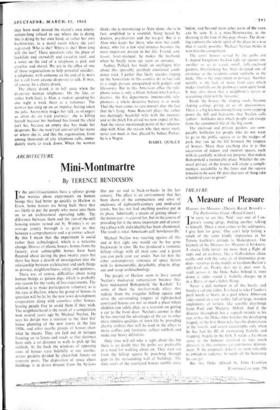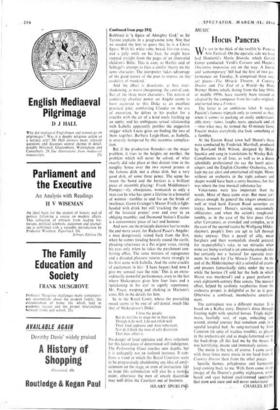THEATRE
A Measure of Pleasure
Measure for Measure. (Theatre Royal. Bristol.)— Tine Perforating Giant. (Royal Court.) 'I'm sorry to see this. Ned.' says one of Con- greve's young sprigs, finding another talking to himself. 'Once a man comes to his soliloquies. I give him for gone.' One can't help feeling a touch of thc same kindly impatience in Sir Tyrone Guthrie's attitude to Shakespeare. The keynote of his Measure for Measure is briskness. A stocky little turret—no more than a flight of steps and an archway. like a Staffordshire china castle, and with the same air of diminutive gran- deur—revolves in the middle of Graham Barlow's split-level set. People dart up it. peer over it, vault across it: the Duke hides behind it, runs down it, sidles round it. Isabella charges up it in a flurry of nun's habits flying.
Never a dull moment in all this bustle, and barely a sad one either. It is hard to take Claudio's peril much to heart, in a gaol where Abhorson rides round on a toy trolley full of large, wooden implements of torture, like sensible playthings from Paul and Marjorie Abbatt. And if the director throughout has a roguish twinkle in his eye, so has the Duke. who watches the developing tragedy of the first three acts, lays his dispositions in the fourth, and averts catastrophe only when he has had his, fill of tormenting Isabella and trapping Angelo in the fifth. It needs a Jacobean sense of the humour inwlyed to take much pleastirC in this tortuous cat-and-mouse &none- ment.. If the enigmatic duke is to seem tolerable fo4Ami,dern audience, he needs all the humanity he can get.
But this Duke (played by John Franklyn [Continued on page 296
Continued front page 2931 Robbins) is 'a figure of Almighty God,' as Sir Tyrone explains in a programme note. Not that we needed the hint to guess that he is a Christ figure. With his white robe, beard, life-size cross, and a jolly smile on his face, he might have stepped straight from the pages of an illustrated children's Bible. This is cant, as Hazlitt said of Schlegel's attempt to foist a similar theory on the same character. The interpreter 'takes advantage of the good nature of the poet to impose on ttW' credulity of mankind.'
And the effect is disastrous, at best over- shadowing. at worst cheapening. the central con- flict of the three main characters. The notion of conferring absolute power on Angelo seems to have occurred to this Duke as an excellent practical joke; comforting Claudio on the eve of execution, he delves in his pocket for a crucifix with the air of a kind uncle fetching up an apple; and his ambiguous sexual relationship with Isabella apparently justifies the suggestive snigger which Lucio gives on finding the two of them together. Barbara Leigh-Hunt, as Isabella, is severely hampered by this eccentric complica- tion.
But if the production flounders on the major problem, it rises to the heights on another, the problem which will never be solved, of what exactly did take place at that distant time in the naughty house over the two stewed prunes in the famous dish, not a china dish, but a very good dish, of some three pence. The scene be- tween the bawd and the Justices is a brilliant piece of ensemble playing: Frank Michilemass's Pompey—sly, obsequious, womanish as only a man can be who has spent a lifetime in a houseful of women—rambles to and fro on the brink of insolence; Gawn Grainger's Master Froth is light- headed with drink but still 'cracking the stones of the foresaid prunes' over and over in an obliging mumble; and Desmond Stokes's Escalus is a consummate piece of tact and humour.
And now, on the principle daintiest last to make the end more sweet, for Richard Pasco's Angelo: a man dangerously reined back from the first, when he comes treading heavily round the castle, pleading reluctance in a flat urgent voice, raising his eyes only when he takes the parchment con- ferring office. The same mixture of repugnance and a dreaded pleasure returns more strongly in his first scene with Isabella. And the same crackle of excitement in his : 'I have begun/And now I give my sensual race the rein.' This is an extra- ordinarily powerful performance, even to the last where Shakespeare gives him four lines and a 'quickening in his eye' to signify repentance. Mr. Pasco, weeping and choking in Mariana's arms, fills in the details for him.
So to the Royal Court, where the prevailing mood seems to be one of self-denial, much like that of Shakespeare's Duke:
I love the people But do not like to stage me in their eyes. Though it do well, I do not relish well Their loud applause and Ayes vehement. Nor do I think the man of safe discretion That does affect it.
No danger of loud applause and Ayes vehement for this latest piece of determined self-indulgence. The Performing Giant touches new depths, Nit it is unhappily not an isolated instance. It con- firms a trend in which the Royal Courtiers seem. to be progressively abandoning any idea of entJr-' tainment on the stage, or even of instruction.
us hope this culmination will alsO be a turni g point; otherwise the men of unsafe discretian may well drive the Courtiers out of business. HILARY SPURLINk







































 Previous page
Previous page